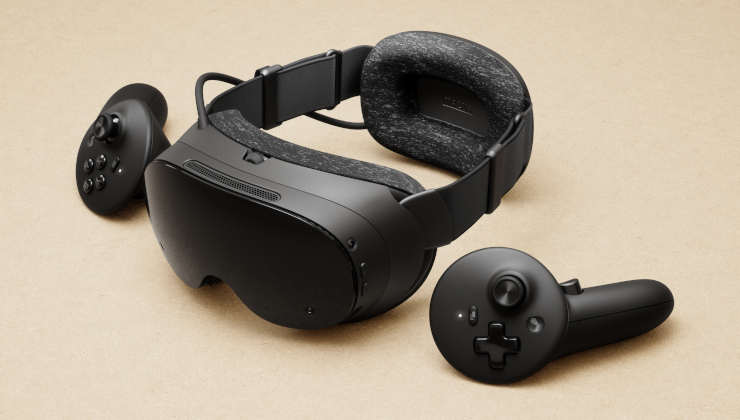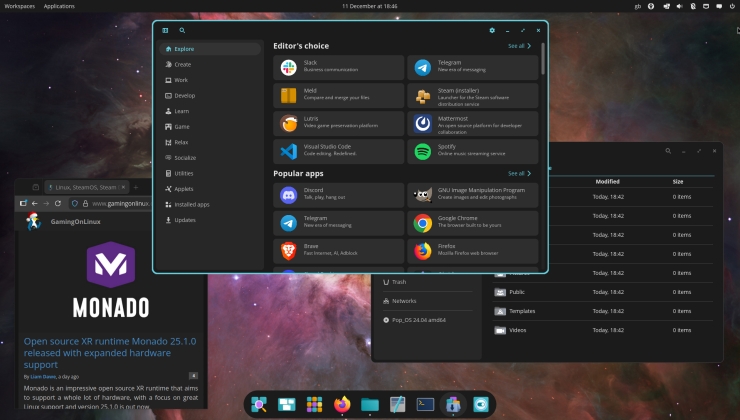While the upcoming Cyberpunk 2077 will not support the Linux desktop, it is at least confirmed to be launching on Stadia same-day as other platforms on November 19.
This gives Linux gamers another way to play, with Stadia getting more huge upcoming games, as on Linux all you need is a Chromium browser and a mouse or gamepad hooked up. If your country is in the supported list for Stadia, that is. Google has still yet to announce wider support for the game streaming service.
Stadia getting probably one of, if not the biggest release this year day and date with other platforms with Cyberpunk 2077 is pretty huge news and perhaps a show of how serious Google are about bringing more people and more games over to it.
From the press release:
“Huge in scale and scope, Cyberpunk 2077 is our most ambitious game to date. It’s humbling to see just how many people are looking forward to playing it, and we want to make it possible for as many gamers as possible come November 19th, when the game launches. The Stadia version will allow players to jump into Night City just seconds after the game unlocks for play worldwide without any downloads needed,” said Michał Nowakowski, SVP of Business Development, CD PROJEKT.
"CD PROJEKT RED are known for developing some of the biggest and best games ever created, and Cyberpunk 2077 is sure to deliver as the most anticipated game of the last few years. We're thrilled to announce that Cyberpunk 2077 will be available on Stadia November 19th. Cyberpunk 2077 on Stadia will allow gamers to play on their favorite screens and never have to wait for a download or install to get into, and explore, the depths of Night City," said Shanna Preve, Managing Director, Stadia Partnerships.
Plenty more footage was shown off recently too on the official YouTube, like this one showing off plenty of the vehicles you will be able to get your hands on:

Direct Link
They also confirmed that people who buy the game on Stadia will get a set of Cyberpunk 2077-themed digital goodies including: the game’s original score, art booklet, the original Cyberpunk 2020 sourcebook and Cyberpunk 2077: Your Voice comic book, as well as a set of wallpapers for desktop and mobile.
It's worth noting also, that CD PROJEKT RED have been embroiled in plenty of controversy around Cyberpunk 2077. Video game journalist Jason Schreier has been covering it in detail, with a developer who was apparently confirmed to be working on it posting about the working conditions on Reddit too. Crunch is seriously terrible and it's such a massive shame these big games keep forcing such terrible conditions on developers.
Don't miss that we're expecting more big Stadia news next week, which we will be following along.
Quoting: Comandante ÑoñardoAlso no doubt at all there. The talks from Bungie, ID etc talk about the porting process. They are native ports.Quoting: rustybroomhandleWish people would stop thinking that Stadia's tech is some huge mystery we have to speculate about. There is info on the web site and there have been very detailed talks by developers. Maybe a recap article that consolidates all of this stuff might help people get off this weird trip.Nobody doubt that Stadia is Debian + Vulkan...
The doubts are if the big games are actually ported to Debian + Vulkan when they could be just Windows games running on Debian + Vulkan via Proton alike compatibility layer, being that the cheapest way according to the mentality of those big publishers.
Maybe Google is earning money using DXVK and the author doesn't even know it.
Quoting: rustybroomhandleStart here:Quoting: Comandante ÑoñardoAlso no doubt at all there. The talks from Bungie, ID etc talk about the porting process. They are native ports.Quoting: rustybroomhandleWish people would stop thinking that Stadia's tech is some huge mystery we have to speculate about. There is info on the web site and there have been very detailed talks by developers. Maybe a recap article that consolidates all of this stuff might help people get off this weird trip.Nobody doubt that Stadia is Debian + Vulkan...
The doubts are if the big games are actually ported to Debian + Vulkan when they could be just Windows games running on Debian + Vulkan via Proton alike compatibility layer, being that the cheapest way according to the mentality of those big publishers.
Maybe Google is earning money using DXVK and the author doesn't even know it.
https://youtu.be/cEQkPe-H05I
Quoting: rustybroomhandleWell that's even more of a kick in the dick.Quoting: rustybroomhandleStart here:Quoting: Comandante ÑoñardoAlso no doubt at all there. The talks from Bungie, ID etc talk about the porting process. They are native ports.Quoting: rustybroomhandleWish people would stop thinking that Stadia's tech is some huge mystery we have to speculate about. There is info on the web site and there have been very detailed talks by developers. Maybe a recap article that consolidates all of this stuff might help people get off this weird trip.Nobody doubt that Stadia is Debian + Vulkan...
The doubts are if the big games are actually ported to Debian + Vulkan when they could be just Windows games running on Debian + Vulkan via Proton alike compatibility layer, being that the cheapest way according to the mentality of those big publishers.
Maybe Google is earning money using DXVK and the author doesn't even know it.
https://youtu.be/cEQkPe-H05I
Quoting: ShmerlHuh, at this point I'm more interested as well into this...Quoting: slaapliedjeMy guess has always been that it's just a massive virtualization platform that spins up a new VM instance whenever someone launches a game. That'd make far more sense than them porting Dx12 games over as quick as they have been.Except it's not the case. Stadia is using Debian Linux + Vulkan. See here:
https://stadia.dev/intl/en_us/about/
Scroll down there and click "See Software Stack".
Custom 2.7 GHz hyperthreaded x86 CPU with AVX2 SIMD and 9.5 MB L2+L3 cacheHow much cash did Google hand off to AMD for this? (I can only guess they're using AMD CPUs there too?)
Custom AMD GPU with HBM2 memory and 56 compute units capable of 10.7 teraflops
16 GB of RAM with up to 484 GB/s of performance
Quoting: slaapliedjeHow much cash did Google hand off to AMD for this? (I can only guess they're using AMD CPUs there too?)Hard to say, but Google has the money to pay as much as needed I'm sure. Yes, they are using AMD CPUs too.
Last edited by Shmerl on 18 Oct 2020 at 6:37 pm UTC
Quoting: GuestSo....running on a (mostly) GNU/Linux system remotelyAnd you know this how?
And if they change mind and put it on windows, you gonna know this how?
Quoting: GuestHonestly, would not mind.Quoting: drjomstoo late but my 5 cents...Would you prefer to stop acknowledging the Wine project as well then? After all, that's for running Windows software, and Windows gaming.
We should stop acknowledge Stadia's existence.
It's as much Linux gaming as some broadcasting of Playstation game on Android phone.
Have very a few proton games.
If it disappeared - I would not be upset.
Quoting: ShmerlI'm not sure I'm going to buy the game any time soon. I'll wait for CDPR to make an effort to release the game for desktop Linux, or the game to go on a major sale on GOG first, to play it in Wine.I said things wrong. I will wait and see if CDPR implements Vulkan for Cyberpunk. If they do, then I will consider buying game early. If they don't, I will do as you and wait til major sale.
If CDPR does not include Vulkan for Cyberpunk or Witcher nextgen, then I will have no doubt anymore about them being hostile to Linux.
Quoting: LinuxwarperI rather wait to buy the game through Steam instead of giving cash to Google. At least Valve is doing things for Linux. And please don't bring up all contributions Google has done for Linux, as of yet there has been very little contributions from them for gaming. If they somehow have made things better on Linux it would seem like a side effect of tech they have used, like how they use Vulkan.Totally agree with this, but I still want Stadia to succeed anyway. Because if it does, it could convince more companies to choose Vulkan over DX12 in the first place, as they would have near to no trouble porting their stuff to Stadia. Linux users would benefit from Vulkan, even if there would be no Linux version at all. And I don't like the idea of MS dominating the graphics api market again...
I really hope CDPR already regrets being tied to DX12, especially now against the background of their crunch time.
Quoting: FrawoTotally agree with this, but I still want Stadia to succeed anyway. Because if it does, it could convince more companies to choose Vulkan over DX12 in the first place, as they would have near to no trouble porting their stuff to Stadia. Linux users would benefit from Vulkan, even if there would be no Linux version at all. And I don't like the idea of MS dominating the graphics api market again...What if Stadia's success turns to dominance, and Google makes streaming exclusive deals? Then you would be trading in one evil with another. I wouldn't worry much about Microsoft dominating, Valve seems to be committed to improving gaming on Linux. They are not only improving Proton (DX11/DX12 games) but they are also providing VR support. I hear the VR support isn't perfect, but neither was Proton either if you look back to when it all began.
I really hope CDPR already regrets being tied to DX12, especially now against the background of their crunch time.
I wouldn't judge CDPR so harshly. Crunch or no crunch at least their game practices are largely good. Where as other companies I bet do crunch on top of filling their games with ads, drm, micro transaction and other awful things. We will see what kind of company CDPR truly is with Cyberpunk and Witcher nextgen. But whatever they do, hateful or angry posts will never help to change the situation.
Quoting: LinuxwarperYou know what is a crazy thought?Quoting: FrawoTotally agree with this, but I still want Stadia to succeed anyway. Because if it does, it could convince more companies to choose Vulkan over DX12 in the first place, as they would have near to no trouble porting their stuff to Stadia. Linux users would benefit from Vulkan, even if there would be no Linux version at all. And I don't like the idea of MS dominating the graphics api market again...What if Stadia's success turns to dominance, and Google makes streaming exclusive deals? Then you would be trading in one evil with another. I wouldn't worry much about Microsoft dominating, Valve seems to be committed to improving gaming on Linux. They are not only improving Proton (DX11/DX12 games) but they are also providing VR support. I hear the VR support isn't perfect, but neither was Proton either if you look back to when it all began.
I really hope CDPR already regrets being tied to DX12, especially now against the background of their crunch time.
I wouldn't judge CDPR so harshly. Crunch or no crunch at least their game practices are largely good. Where as other companies I bet do crunch on top of filling their games with ads, drm, micro transaction and other awful things. We will see what kind of company CDPR truly is with Cyberpunk and Witcher nextgen. But whatever they do, hateful or angry posts will never help to change the situation.
Look at where we are now and where we were 8 years ago, pre-steam on Linux... we had a couple attempts at porting houses that had disappeared, and we had open source games and engine recreations. That was about it. MS putting fear into Valve pretty much have given us so many games I couldn't keep up, and I tried for a while!
With proton and the HUGE advances Wine has made, it is almost seemless and so many of us can just ditch Windows now. But I can't help but think that Google with Stadia should be helping us out here... like they should make it part of the deal that the port is to be released on desktop Linux at 6 months or a year later. As it is though they basically are exclusives for a platform I will never own.
Quoting: slaapliedjeBut I can't help but think that Google with Stadia should be helping us out here... like they should make it part of the deal that the port is to be released on desktop Linux at 6 months or a year later. As it is though they basically are exclusives for a platform I will never own.My thought exactly. Google could do a lot more to change the situation. But they aren't interested.
Last edited by Shmerl on 20 Oct 2020 at 2:35 am UTC
Quite honestly such argument is nonsense. Looking at a indie game being available on Linux and then asking why big games can't be either. I don't know it all, but one thing I know I should expect from developers it is to provide Vulkan renderer and get involved with Proton issues for their games. If a company decides to port their games, then find out the business isn't there for them then they will give up on Linux in a sour way. I hope Proton will increase marketshare and raise awareness so that Linux gets to that point that more games will be worth it.
It may be a unpopular opinion, but tell me friends..where is that Metro Exodus port we were told would come? If major games like it are so profitable on Linux, why are they so few and far in between? I feel like by time a new major game is released for Linux (year or years later) the Windows version should be very playable through Proton and cost much less ($10 vs $50+).
Besides, the work and expenses point was addressed above. They already have invested needed effort and spent the money to make it work on Stadia,
Last edited by Shmerl on 21 Oct 2020 at 4:29 pm UTC
Quoting: LinuxwarperI think the expectations of companies porting to Linux is somewhat unreasonable in general. If a company does so, goes through major work to provide a quality release where they target Ubuntu, and then the return on investment is low - why should they? And the assertion that "Indies can manage to make games for many distros why can't big companies???!" is such cloudy argument. Indies are small games with simple design that are easy to scale to Linux. Where as when you are developing a major game like AC Valhala or Cyberpunk, even representing cars in the game becomes a huge project in itself. You have tech like DLSS and raytracing. If big games were so easily and cost effective to release for Linux as indies are, then you would surely have seen raytracing for many if not all indie games. And I am not talking about "We have raytracing", I am talking about shadows, global illumination and reflections.I was wondering about Exodus the other day. In the discussion forums on Steam it sounds like they're still working on it? But I mean it's been on Stadia since forever.. so if the theory is it's just a direct thing to release a game on Stadia onto Steam with Linux support... maybe that's the one that proves it's not the case?
Quite honestly such argument is nonsense. Looking at a indie game being available on Linux and then asking why big games can't be either. I don't know it all, but one thing I know I should expect from developers it is to provide Vulkan renderer and get involved with Proton issues for their games. If a company decides to port their games, then find out the business isn't there for them then they will give up on Linux in a sour way. I hope Proton will increase marketshare and raise awareness so that Linux gets to that point that more games will be worth it.
It may be a unpopular opinion, but tell me friends..where is that Metro Exodus port we were told would come? If major games like it are so profitable on Linux, why are they so few and far in between? I feel like by time a new major game is released for Linux (year or years later) the Windows version should be very playable through Proton and cost much less ($10 vs $50+).
Sadly a lot of the 'do we port to Linux' is politically based more than financially based. Like Doom (2016) literally having a Linux port made for fun, but was never published / released.
Quoting: slaapliedjeSadly a lot of the 'do we port to Linux' is politically based more than financially based.Yes, there is a lot of it. That's what I called above platform politics.
Quoting: ShmerlIt's not nonsense because you need to compare resources, not just the amount of work. Small developers have less of them than big companies. So it's a bigger risk for them because of that alone. It's harder to make profit for small developers. Yet they are the ones releasing for Linux, not the huge ones who are making way more money and have more resources for it.A factor in that regard is the engine. That indies can easily create crossplatform solutions is, most of the time, related to the fact that they use the most popular engines around (i.e. Unity or Unreal 4) with not too many third party dependencies. So even when you can't compare resources between an indie and a AAA company you normally can expect that the indie may have an easier path in order to get the Linux build as most of the cross platform work is already done by the big companies behind those engines (unless there is a bug in the engine... which will end up being fixed by the engine company or with a workaround).
I think that you're missing the picture regarding the ROI concept. IMO, in most cases getting profits from a Linux release is not a big issue as a crossplatform solution for your game is not such a big deal as it used to be 10 years ago. The problem is that for a $X inversion for a Linux release they will probably get a ROI that is well below the ROI that what the publisher would get if they invest that same $X in some extra feature for your game (a.k.a. DLC).








 How to setup OpenMW for modern Morrowind on Linux / SteamOS and Steam Deck
How to setup OpenMW for modern Morrowind on Linux / SteamOS and Steam Deck How to install Hollow Knight: Silksong mods on Linux, SteamOS and Steam Deck
How to install Hollow Knight: Silksong mods on Linux, SteamOS and Steam Deck